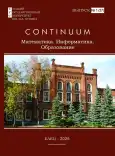Предметно-методические дефициты будущих учителей математики и пути их устранения в цифровом обществе
- Авторы: Буракова Г.Ю.1, Карпова Т.Н.1, Кузнецова И.В.1
-
Учреждения:
- Ярославский государственный педагогический университет им. К.Д. Ушинского
- Выпуск: № 1 (2025)
- Страницы: 43-54
- Раздел: Теории, модели и технологии обучения математике и информатике в системе профессионального образования
- URL: https://bakhtiniada.ru/2500-1957/article/view/304941
- DOI: https://doi.org/10.24888/2500-1957-2025-1-43-54
- ID: 304941
Цитировать
Полный текст
Аннотация
В статье представлены результаты диагностики будущих учителей математики, проанализированы проблемы предметно-методической подготовки студентов: слабая подготовка абитуриентов, особенно по геометрии; трудности в применении теоретических знаний к решению задач повышенного уровня сложности, освоение которых происходит на старших курсах; невладение способами критериального оценивания письменных работ учащихся и др. Предложены основные направления устранения профессиональных дефицитов будущего учителя математики в условиях цифрового общества: реализация индивидуальных образовательных маршрутов обучающихся с усилением внимания на рассмотрение типов задач, приёмов и методов их решения; создание методической копилки сложных математических задач; использование дидактических возможностей генеративного искусственного интеллекта; качественное формирование ментальных образов, схем и моделей учебной дисциплины. Рассмотрены некоторые дидактические возможности генеративного искусственного интеллекта, которые можно использовать при подготовке будущего учителя математики с целью устранения профессиональных дефицитов. Искусственный интеллект может быть использован при подготовке будущего учителя математики в качестве рабочего инструмента в форматах адаптивного и персонализированного обучения. Формат персонализированного обучения является эффективным инструментом повышения результативности учебной деятельности будущих учителей математики на основе использования различных информационных ресурсов и цифровых технологий, автоматизации основных видов образовательной деятельности. Представленные примеры методических заданий, выполняемые в рамках изучения методических дисциплин, направлены на формирование у будущих учителей математики методов решения различных классов задач; умения проводить занятие одной задачи, находить ошибки в представленных способах решения задач, составлять цепочки задач.
Об авторах
Г. Ю. Буракова
Ярославский государственный педагогический университет им. К.Д. Ушинского
Автор, ответственный за переписку.
Email: burakova.galina@inbox.ru
к.п.н., доцент г. Ярославль
Т. Н. Карпова
Ярославский государственный педагогический университет им. К.Д. Ушинского
Email: karpovafmf@mail.ru
к.п.н., доцент г. Ярославль
И. В. Кузнецова
Ярославский государственный педагогический университет им. К.Д. Ушинского
Email: gits70@mail.ru
к.п.н., доцент г. Ярославль
Список литературы
- Буракова Г.Ю., Карпова Т.Н., Мурина И.Н. Элементарная математика: учебное пособие. Часть I. Ярославль: Изд-во ЯГПУ, 2012.
- Галустов А.Р., Герлах И.В., Голодов Е.А., Насикан И.В. Предметные и методические компетенции учителей математики, проявляющиеся в условиях цифровой трансформации образования // Перспективы науки и образования. 2022. № 3 (57). С. 658-679. doi: 10.32744/pse.2022.3.38
- Дополнительные разделы школьного курса математики. Задачи с параметрами: учебно-методическое пособие / сост. Г.Ю. Буракова, Т.Н. Карпова. Ярославль: Изд-во ЯГПУ, 2017.
- Клещева И.В., Снегурова В.И., Стефанова Н.Л. Результаты исследования предметно-методической компетенции учителей математики // Бизнес. Образование. Право. 2022. № 1 (58). С. 265-271. doi: 10.25683/VOLBI.2022.58.114.
- Кузнецова И.В. Цифровизация обучения: от микрокалькулятора к web-технологиям // Вестник Тверского государственного университета. Серия: Педагогика и психология. 2020. № 2(51). С. 187-191. doi: 10.26456/vtpsyped/2020.2.187.
- Национальная Стратегия развития искусственного интеллекта на период до 2030 года // Стратегические приоритеты. 2019. № 2(22). С. 151-166.
- Пак Н.И. Особенности отбора содержания образования при цифровой трансформации // Информатизация образования и методика электронного обучения: цифровые технологии в образовании: Материалы VIII Международной научной конференции. В 4-х частях, Красноярск, 24–27 сентября 2024 года. Красноярск: Красноярский государственный педагогический университет им. В.П. Астафьева, 2024. С. 347-351.
- Профессиональный стандарт «Педагог (педагогическая деятельность в сфере дошкольного, начального общего, основного общего, среднего общего образования) (воспитатель, учитель)». Приказ Министерства труда и социальной защиты Российской Федерации от 18 октября 2013 г. №544 г. Москва [Электронный ресурс]. Режим доступа: http://www.rg.ru/2013/12/18/pedagog-dok.html
- Стефанова Н.Л. Предметно-методическая составляющая готовности бакалавров к профессиональной деятельности учителя математики // Известия Российского государственного педагогического университета имени А.И. Герцена. Санкт-Петербург, 2019. №191. С. 80-90.
- Тумашева О.В., Шашкина М.Б., Алешина Е.А. Профессиональные дефициты учителей математики // Азимут научных исследований: Педагогика и психология. 2021. T. 10. № 1(34). С. 264–268.
- Уваров А.Ю., Гейбл Э., Дворецкая И.В. и др. Трудности и перспективы цифровой трансформации образования. Москва: ИД ВШЭ, 2019. 288 с. Электронный ресурс (дата обращения 19.10.2024) https://ioe.hse.ru/data/2019/07/01/1492988034/Cifra_text.pdf
- Шкерина Л.В. Профессиональные дефициты учителя математики и их причины // Вестник Красноярского государственного педагогического университета им. В.П. Астафьева. 2021. № 56(2). С. 82–92.
Дополнительные файлы







